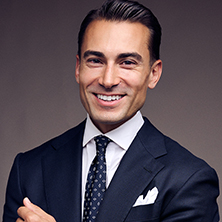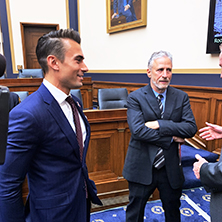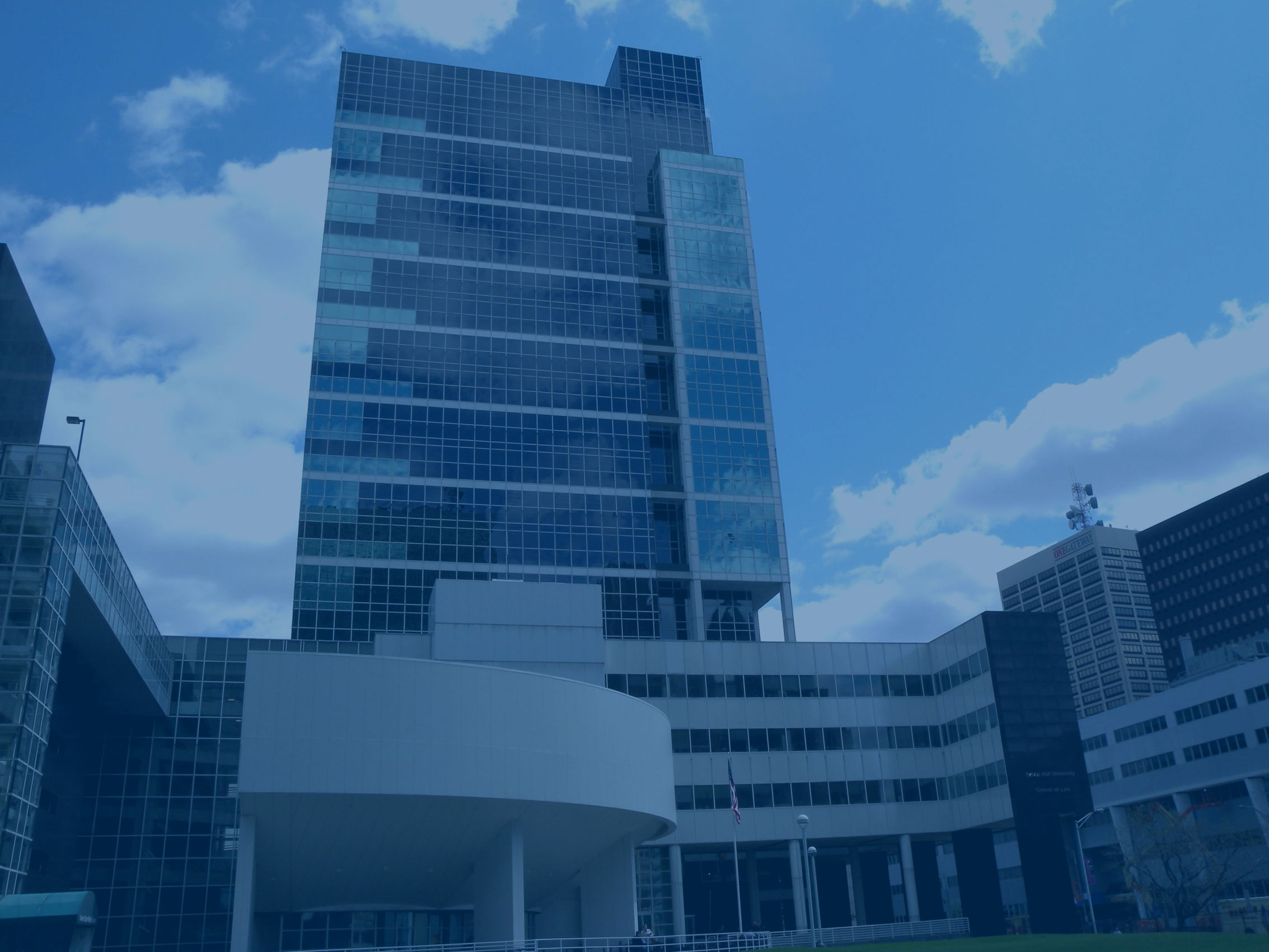Christopher Baione ’13
Founding Partner, Pitta & Baione

Why Seton Hall Law?
My hometown of Staten Island is nestled between Manhattan and New Jersey. After receiving my undergraduate degree in finance from St. John's University in New York, I felt that I should have a New Jersey diploma. Seton Hall Law is a New Jersey school with a national brand, a modern campus, and boasts an incredibly close-knit alumni community, which to me, is more valuable than the name on the diploma or ranks in a guidebook.
Law school was always a possibility for me, but never a certainty…until the stock market crashed. One of my mentors, Frank Sinatra (the lawyer not the singer) always told me “You can be a lawyer who doesn't practice law,” and sold me on the idea that a law degree enhances your career. So, a law degree made more sense than an MBA. I ended up choosing to be a lawyer and never looked back. It is the best decision I've ever made. With that being said, my finance degree has helped in operating the firm as a business.
How did your prior career experience influence your decision to start your own firm and shape the type of practice you wanted to create?
Working for the Honorable Anthony J. Cutrona in the Mental Hygiene Part of Kings County Supreme Court profoundly impacted not only my view of the law, but my view of the world. The court deals with a cross-section of government control, constitutional and healthcare rights, justice, public safety, and intrafamily struggles. Judge Cutrona taught me to manage all of these complexities by taking a holistic approach. This motivated me to build a law firm that treats each client as an individual, deserving of respect, empathy, and, ultimately, justice. Turley Hansen & Partners taught me the challenges of applying this approach to a volume practice, and the complexities of practicing with partners.
My brother, Matt, and I are partners in Pitta & Baione. We do our best to maintain and balance our family relationship, our friendship, and our partnership knowing that the implications could be fatal for our firm and detrimental to our clients. We have two other partners who have since become our cousins through marriage - Vincent Pitta, a legal titan and labor law legend, and his son, our best friend Vito Pitta who serves as counsel to the Mayor of New York City. We're tremendously grateful and proud to be a family shop. We each have unique skills and experience that, together, make the whole greater than the sum of its parts. Our success is owed to this dynamic.
September 11, 2001, had a profound impact on our world. Experiencing firsthand the health effects of those in and around the 9/11 toxins-exposure, at what point did you decide to merge those personal passions with your legal career?
9/11 had a tremendous impact on me. My father lost his best friend who I affectionately called uncle. My cousin was trapped in the dust cloud and stuck in a daze for hours before anyone could find her. My neighborhood was full of victims and responders. It was not far from the Fresh Kills Landfill- where debris from the towers were sifted in search of body parts. That day changed me, and everything and everyone around me. It was everywhere all the time.
This inspired me to pursue a legal career that would ensure victims get the justice and equity they deserve when disaster strikes. When I graduated Seton Hall Law in 2013, my brother, Matt, was working for a litigation firm where one of the partners started a practice focusing on September 11th Victim Compensation Fund (VCF) claims. Matt recommended me to the partner for an associate position and I seized on the opportunity to connect my passions to my legal career. I am incredibly proud to say that I have spent my entire career advocating for 9/11 victims and their families. The rest, as they say, is history.
How has the Never Forget the Heroes: James Zadroga, Ray Pfeifer, and Luis Alvarez Permanent Authorization of the September 11th Victim Compensation Fund Act, which was made into law in 2019, changed individuals' awareness of the resources available to them?
 The battles in both the court of public opinion and the chambers of Congress rightfully
drew extensive media coverage. I was in the room when Detective Luis Alvarez delivered what would turn out to be his swan song before the House Judiciary Committee.
He testified in between treatments for terminal cancer and died just a few months
later. Detective Alvarez used some of his last breaths to do what he did his whole
career - serve the public. It was both heartbreaking and electrifying. Thankfully,
Jon Stewart backed up Detective Alvarez in the hearing and continued the public battle to pass
common sense legislation to compensate those who were told the air was safe to breathe.
Not only did this work help the legislation pass, but also helped to raise public
awareness about the resources available to them through extensive media coverage.
The battles in both the court of public opinion and the chambers of Congress rightfully
drew extensive media coverage. I was in the room when Detective Luis Alvarez delivered what would turn out to be his swan song before the House Judiciary Committee.
He testified in between treatments for terminal cancer and died just a few months
later. Detective Alvarez used some of his last breaths to do what he did his whole
career - serve the public. It was both heartbreaking and electrifying. Thankfully,
Jon Stewart backed up Detective Alvarez in the hearing and continued the public battle to pass
common sense legislation to compensate those who were told the air was safe to breathe.
Not only did this work help the legislation pass, but also helped to raise public
awareness about the resources available to them through extensive media coverage.
Government outreach was minimal in the early years of the VCF and the WTC Health Program. While that has improved, I regularly hear misinformation from prospective clients and the general public. The truth is that the law is complex, the procedural rules constantly change, and the many years spent fighting for extensions has clouded the basic facts about who is eligible, and which benefits they are entitled to. We have made it our mission to raise awareness about the benefits available to families by routinely participating in grassroots outreach efforts locally and nationally.
How does your career challenge you?
Advocating individually on victims' cases while simultaneously advocating for the 9/11 community at large through lobbying and watchdog efforts that will ensure the legislation does its job and is expanded when needed. For example, in the past few years alone, our firm worked on the efforts to pass the Never Forget the Heroes Act which fully funded the September 11th Victim Compensation Fund through 2090, revise the VCF registration deadlines, add uterine cancer to the list of 9/11-related illnesses, change the New York workers' compensation law to recognize the federal presumption of 9/11 causation, pass New York State legislation to streamline Surrogates' Court proceedings for families of those who passed from 9/11 toxins exposure, provide additional funding to the World Trade Center Health Program, and extend WTCHP eligibility to include Department of Defense responders to the Pentagon.
You previously stated that you "had to buy many boxes of sympathy cards because clients are dying on a weekly basis." What advice can you give to others who may work in similar situations and how to deal with emotional toll?
Before anything else, empathy and displays of dignity are of the utmost importance. As attorneys, though, we also have an obligation to channel that empathy into providing the client with the right advice at the right time. You cannot let the gravity of the situation, or the weight of the emotions, interfere with your judgment. You can channel that empathy into pursuit of justice for your client by letting it fuel your advocacy. Embrace the empathy as you write and speak on behalf of your clients.
What is Pitta & Baione's next steps for continued success?
We continue to court talented, driven, and empathetic lawyers and professionals who are dedicated to serving our clients and the 9/11 community at large. We will also continue to grow with the needs of our clients. For example, Lian Kuang-Maoga, Esq. recently joined our firm to provide estate and benefit planning, probate, and trust services. Our clients needed these services, so we brought them in-house. We also developed a multilingual team of staff and attorneys to service the large number of Chinese and Spanish speaking residents who lived within the 9/11 exposure zone. We plan to continue to grow organically with our clients' needs. Thanks to our Pitta partners, our reach and stature grows every day.
Looking back, how did your Seton Hall Law experience prepare you to serve in your career?
The core tenets I learned at Seton Hall Law formed the foundation for my career. I was introduced to, worked hard to learn, and ultimately mastered the very same skills at Seton Hall Law that took my career exactly where I wanted it to go: time management, the ability to prioritize, learning to process complex legal information like court decisions and statutes and explain it to non-lawyers in a way that they'll understand, and the importance of building and maintaining a network of classmates. We continue to stay in regular contact with one another, refer business to each other and stand ready to help our fellow alum on an as needed basis.
More specific to my current practice, my professors and the Seton Hall Law community taught me to be respectful to all those I encounter, along with the importance of helping out - whether it's a client who doesn't have much money, or a family friend in a bind who needs legal advice.
The most direct preparation was through my Intellectual Property Law concentration and Entertainment Law track, which I had a strong interest in but never utilized until later in my career. I'm now fortunate enough to use what I was taught to represent a talented actor/model whose breakout project was acting alongside Adam Sandler in Uncut Gems. This is something that I truly enjoy and intend to develop into another practice area.
You attended your first alumni event at our Monmouth County Happy Hour in June of 2022. After your graduation in 2013, what motivated you to re-engage in the SHU Law community?
The Monmouth County Happy Hour was my first official alumni event, but I've been engaged with the Seton Hall Law community since graduating in 2013 through daily conversations with friends, happy hours, weddings, dinners, business engagements, etc. Some of my closest and most important relationships were forged at Seton Hall Law. My good friend and current Seton Hall Law adjunct professor Michael Collins and Alumni Council member invited me to the Happy Hour and opened my eyes up to engaging beyond my friend group to alumni of other graduating classes. Years went into building my law firm and then steering it through the pandemic. Now that the firm is solidified and COVID is getting behind us, I decided it was the perfect time to engage more deeply with the Seton Hall Law community.
Why do you feel it is important for alumni to give back to Seton Hall Law?
It is more than important, it is necessary. The school is not-for-profit, and any benefits I received by attending were not bought. They were passed down by the success and sacrifice of those who graduated before me. Whether we contribute time, money, or both, it helps to ensure Seton Hall Law will continue to court the best professors, recruit the best students, and educate the best lawyers for years to come.
Seton Hall Law alumni can update your information and share your Seton Hall Law story here.
For more information on supporting students at Seton Hall Law contact the Office of Alumni and Development at 973-642-8711 or [email protected]. To make a gift now, visit law.shu.edu/makeagift.

